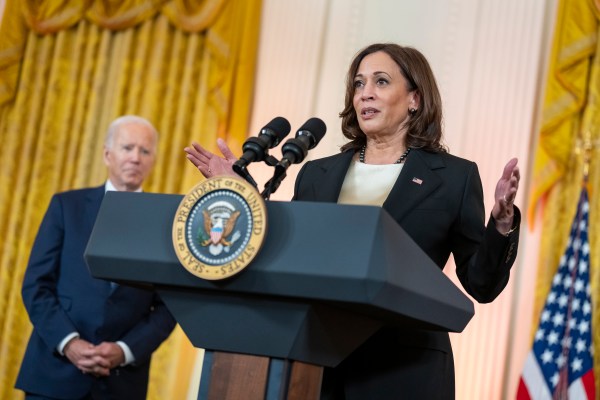After President Biden’s departure from the presidential race, all eyes are on Vice President Kamala Harris — and how she might continue Biden’s climate legacy.

Climate groups were among those who joined the chorus calling on Biden to step down last week. And now that he has, many of them have quickly stepped behind Harris’ presidential campaign. They told Grist they’re confident she’ll continue scaling up clean energy investment, and some cited her opposition to fracking and track record prosecuting fossil fuel companies as a sign she’ll take Biden’s climate achievements even further.
But before this all went down, the Republican National Convention highlighted the GOP’s very different priorities. At the end of a week of fossil fuel boosterism, former President Donald Trump led cheers of “drill, baby, drill,” and promised to halt offshore wind projects and electric vehicle mandates “on day one” of his hopeful term.
And it would probably be easier this time around, a Trump-era EPA official told the New York Times. “They’re going to have better people, more committed people, more experienced people. They will be able to move more quickly, and more successfully, in my view.”
A few miles away from the RNC, some conservative clean energy advocates and Republican leaders tried to make a different case. They told the Energy News Network that Trump’s “green new scam” attacks were just empty rhetoric, and were optimistic Trump would come around to clean energy’s market benefits and job creation potential.
Considering that no Republicans voted for the Biden administration’s landmark climate law and that Trump has a four-year track record of boosting fossil fuels and dismantling environmental regulations, that probably won’t be an easy task.
A Rhodium Group report out today highlights why this all matters for climate. Federal incentives and regulations currently in place — like clean energy tax credits passed under the Inflation Reduction Act and the EPA’s power plant emissions rules — are set to slash greenhouse gas emissions as much as 43% by 2030. That’s still below Paris Agreement goals, but if climate rules and incentives are rolled back like Trump has promised, researchers say the trend of declining emissions will start to plateau.
More clean energy news
⚖️ Resilient regulation: A federal court rules the U.S. EPA rule targeting coal power plant emissions can stand as it faces continued legal challenges. (Associated Press)
🏭 Missing the mark: A U.S. EPA regulation enacted a decade ago has successfully encouraged sharp emissions cuts at most of the 130 oil refineries it targeted, but pollution has skyrocketed at dozens of other facilities often located in low-income communities of color. (E&E News)
😪 Finally, a permitting bill: After two years of talks, Independent Sen. Joe Manchin and Republican Sen. John Barrasso agree on a permitting reform bill that would pave the way for increased renewable energy and fossil fuel development. (The Hill)
💸 IRA rollout race: The EPA is racing to disburse $27 billion from a clean energy and efficiency fund before the election, though the speedy rollout and a lack of oversight risks mistakes. (Politico)
☀️ Heat risks can multiply: Nearly half of Americans live in states that don’t bar electricity shutoffs during heatwaves, putting 45 million low-income Americans at risk of being unable to cool their homes when heat turns deadly. (The Guardian)
☃️ AC assistance wanted: Advocates say the federal energy assistance program LIHEAP favors heating assistance in cold-weather states, and should be retooled to better support cooling assistance in warming climates. (Inside Climate News)
🌀 Powering through Beryl: Houston home solar-battery owners were able to keep themselves powered through Hurricane Beryl and its aftermath, demonstrating the potential of distributed energy as CenterPoint Energy took days to restore power across the city. (Canary Media)
🤝 Shifting alliances: The shift to electric vehicles exposes a divide between U.S. automakers and the oil industry, which had previously worked together to block environmental regulations. (Inside Climate News)
⚡ Fast charging pulls ahead: The U.S. added 704 public fast charging stations in the second quarter, a pace that a new report estimates would see fast chargers outnumber gas stations in eight years — though charger deployment is set to accelerate even further. (Bloomberg)
📢 We want to hear from you! Send us your questions, comments, and story tips by replying to this email.
💸 Support our work: The Energy News Network is powered by support from readers like you. If you like Energy News Weekly, share it with a friend! Or give today and help us keep our news open and accessible for all.
📧 Want more energy news? Sign up for our daily digests.
